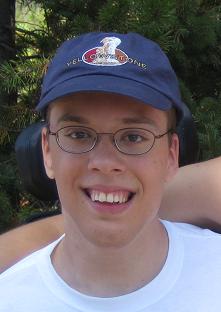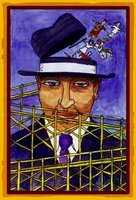“…not this separate category of human beings”
Fifty years ago, babies born with developmental disabilities were routinely placed in institutions by their families under the direction of their family doctors. Health care professionals often advised families to forget the child, to have other children, and move on with their lives. It’s an appalling time in our history – babies and young children routinely abandoned and forgotten.
I think it’s important that we recognize and remember this cruel part of our history. Kay Olson from the Gimp Parade says,
“My personal thought on what happened 40+ years ago is that it was a tragedy for whole families and has undoubtedly had a lasting impact on how we view developmentally disabled people today. That is, we're still living with the legacy of those folks being segregated, made invisible, and devalued. It has impacted how we view developmental disability and the way we think of difference - we have all been taught implicitly by this history that people who are intellectually or developmentally different do not belong among us because they're dangerous, completely incompetent and lack any ability to contribute to society.”
While I was away last week, CNN covered the story of one man’s search for his sister. Jeff Daly made a documentary, “Where’s Molly?” in which he talks candidly about what it was like to be a 6 year old and have his sister sent away, rarely spoken of and advised to be forgotten. CNN shows a clip of the documentary and has an excellent article on Jeff’s and Molly’s experiences.
Kay’s words above are in a CNN blog that she wrote on this topic. She writes about he challenges of accurate diagnosis and the even greater challenges of predicting potential.
More from Kay on how the line between “us” and “them” is not so solid and clear cut:
“I think the main thing that nondisabled people don't necessarily know or understand is that developmentally disabled people are not this separate category of human beings. People tend to think, "We can do things. They cannot." And there's no line like that dividing all of us. There are shades of ability, varying talents that surface in surprising places. This is true for physical disabilities as well. Most of us, in the course of our lives, discover we have abilities or affinities for some things and lack talent elsewhere, so this idea that a certain class of people lack value or the ability to contribute inevitably underestimates and wastes a lot of human potential.”
I think it’s important that Jeff and Molly Daly’s story be heard. We cannot move forward until we acknowledge where we have come from. Jeff Daly is now working to reunite families affected by this tragedy. There is a national registry, called The National Find Families Registry, to help families affected by institutionalization to find each other.
Thanks to Elizabeth Cohen and Jennifer Pifer of CNN for bringing this important issue to the public’s attention. So often, it feels like the media’s stories about disabilities are superficial and artificial, “feel good” stories that are designed to entertain or “inspire” those without disabilities; stories that maintain difference, segregation, and the status quo. This is a real story with important ramifications, things to contemplate and learn, and also with actions to be taken.
Lastly, I have to say how much I admire Kay Olson’s style of advocacy. Her approach is thoughtful, reflective and encourages open dialogue. She is thought provoking and assertive without being hurtful or condescending. Kay is the quintessential advocate. I learn a lot from you, Kay - Thanks!










8 comments:
It's really sad to think about this part of history, and I think that's why many people try to forget that it ever happened. We're doing the same thing to an entire movement that that movement was doing to the people directly. And you're right, it causes it to happen more.
-Aaron
David,
In some states, the institutions continue, albiet under new names, missions, etc..
And the institutional mentality remains. When my daughter was born three years ago, the hospital social worker had to emphasize to the insurance company that
1) we were taking Hannah home with us
2) besides, there weren't any institutions in Oregon that would accept a child using a ventilator (e.g. kids in nursing homes, near-permanent hospital institutions, etc.)
The insurance company had different expectations (which would have saved them money, of course).
OK, I could rant all day, but thanks for the post and for the reminder on "Where's Molly." I live in Hillsboro, OR, and Jeff and Molly live nearby as I understand it.
And Hannah continues to live & thrive at home BTW.
Thanks for sharing your thoughts.
Here's a Wall Street Journal story about a girl who has been living in a nursing home since she was 10 years old. The article talks about the costs of nursing homes vs. home care and the insurance issues.
Outrageous.
You should read "The Memory Keeper's Daughter," by Kim Edwards. It deals with this very subject.
Thanks for the link, David. I learn from you too, you know. :)
David
Thank you for your eloquent words and for posting this blog.
I founded an organization called Dreams for Kids, www.dreamsforkids.org in 1989.
We began our efforts to underprivileged youth, and in 1996 expanded our mission to develop the first sports and activities program in Chicago for children with disabilities.
I wrote a book on the history of our organization and our mission to end the isolation of children of disability - whether that disability is poverty, or physical or cognitive challenges.
Since being published, Kiss of a Dolphin has ignited a movement much like the desires you have expressed.
We have begun a global expansion and will continue to spread our program, Extreme Recess, and our Dream Leader program which gives kids of all abilities the opportunity to work in small groups and serve the local and world communities- and learn of the ability that lives in each of us.
Visit our site and send us an email David and I will send you a copy of Kiss of a Dolphin as my gift.
May you always live your dreams!
Tom Tuohy
I second reding "The Memory Keeper's Daughter" by Kim Edwards. It makes you really think.
Thanks for comments and the book and website recommendations. I'll check them out.
Post a Comment